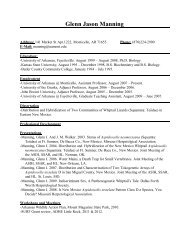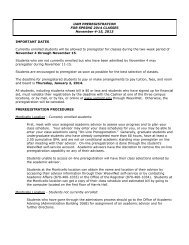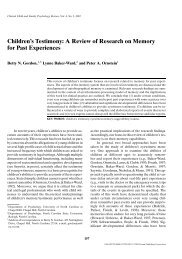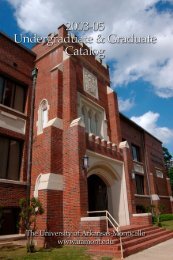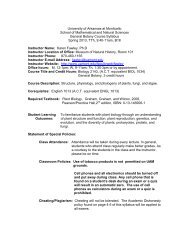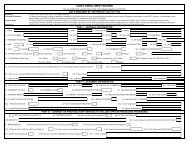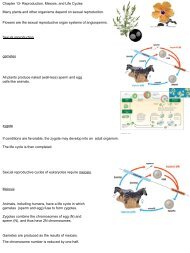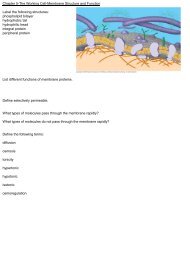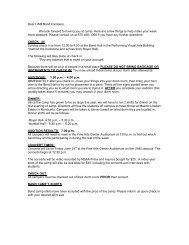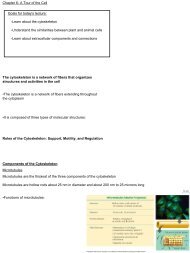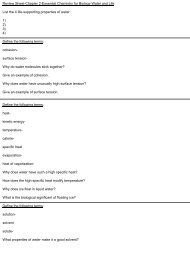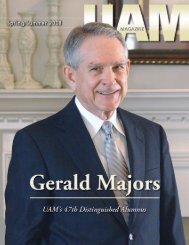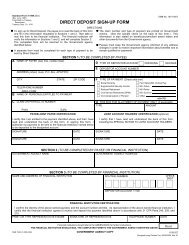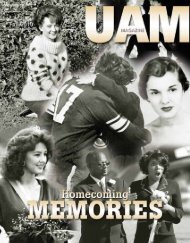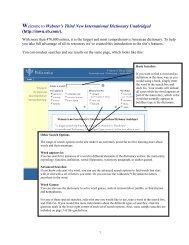Remembering and Forgetting Ebbinghaus Nonsense Syllables ...
Remembering and Forgetting Ebbinghaus Nonsense Syllables ...
Remembering and Forgetting Ebbinghaus Nonsense Syllables ...
Create successful ePaper yourself
Turn your PDF publications into a flip-book with our unique Google optimized e-Paper software.
<strong>Ebbinghaus</strong><br />
<strong>Remembering</strong> <strong>and</strong> <strong>Forgetting</strong><br />
• First person to use experimental design to<br />
study memory<br />
• Methodological concerns:<br />
– If you want to study learning, it is best to find<br />
someone who has no prior experience<br />
• If you are studying how people learn psychology<br />
concepts, your subjects should not be psychologists<br />
–<br />
• <strong>Nonsense</strong> <strong>Syllables</strong><br />
• Defined:<br />
<strong>Nonsense</strong> <strong>Syllables</strong><br />
– More importantly, these syllables have no<br />
meaning, <strong>and</strong> the words have never been learned<br />
– VOX, TIL, JIV<br />
– Because words have no meaning, any memory of<br />
the words is due to experimental conditions, <strong>and</strong><br />
not to previous experience<br />
Number of <strong>Syllables</strong> <strong>and</strong><br />
Rehearsal<br />
• <strong>Ebbinghaus</strong> memorized lists of<br />
varying numbers of nonsense<br />
syllables<br />
– Wanted to examine whether<br />
– He found, of course, that is does<br />
– The longer the list, the more<br />
effort it takes to learn the list<br />
<strong>Ebbinghaus</strong>’ Contributions<br />
• Brought the study of memory into the realm<br />
of scientific study<br />
• Helped to establish learning <strong>and</strong> cognition<br />
as legitimate subject matters in psychology<br />
• Savings:<br />
– When people forget information, all is not lost<br />
Bartlett<br />
• Claimed that <strong>Ebbinghaus</strong>’ nonsense syllables were<br />
problematic<br />
– In the real world, people are more likely to be asked to<br />
remember familiar material<br />
–<br />
• Material is likely to be rehearsed by relating it to other similar<br />
information already in memory<br />
– Research on memory should focus on conventional<br />
functions in the real world, not learning of nonsense<br />
syllables in artificial laboratory setting<br />
1
Bartlett’s Experiment<br />
• Presented subjects with folk stories, short<br />
essays, <strong>and</strong> descriptions of human activity<br />
• Then would ask subjects to reproduce<br />
information<br />
–<br />
– Related to one of today’s hot topics in memory:<br />
Fuzzy Trace Theory<br />
Fuzzy Trace Theory<br />
• Gist vs. Verbatim Memory Traces (Reyna <strong>and</strong><br />
Brainerd, 1995)<br />
–<br />
–<br />
– Younger children rely on verbatim recall; Older<br />
children more dependent on gist<br />
– If memory is tested soon after the to-be-remembered<br />
event, individuals depend on verbatim recall<br />
• As delay increases, verbatim decays, <strong>and</strong> use of gist increases<br />
Bartlett’s Contributions<br />
Information Processing:<br />
The Stage Model<br />
• Recognition that memory is not veridical<br />
– In other words, memories are not exact<br />
reproductions of the remembered event<br />
– Memories are ____________, with knowledge,<br />
schemas, <strong>and</strong> scripts filling in the details<br />
– Any recall of an event is composed partly of<br />
actual memory, <strong>and</strong> reconstructions using<br />
memory from similar events<br />
• Defined:<br />
The Sensory Store<br />
– How much information is available to sensory<br />
store is limited by sensory receptors<br />
• This information is stored in sensory store for a brief<br />
period after stimulus is no longer acting upon<br />
sensory receptors<br />
Experiments on the Sensory Store<br />
• Sperling (1960): Participants shown<br />
matrix of letters for 1/20 of a second<br />
• A tone then indicates which row the<br />
subject should try <strong>and</strong> remember<br />
•<br />
– A good deal of the matrix is available in<br />
sensory store immediately after it is<br />
presented<br />
• If tone delayed even briefly, the<br />
number of items recalled drops<br />
drastically<br />
• Led to idea of Iconic Image<br />
2
Types of Images in Sensory Store<br />
• Iconic image:<br />
• There is also evidence of Echoic Images:<br />
Short-Term Store<br />
• People must attend to or rehearse<br />
information actively if it is to make its way<br />
from the sensory store to the next<br />
processing stage: the Short-Term Store<br />
• Defined:<br />
Characteristics of<br />
Short-Term Store<br />
• Contains words, images, numbers, etc. that<br />
are being attended to at a given moment<br />
• Miller’s Magical Number:<br />
–<br />
– Depends on how you define “item”<br />
• <strong>Remembering</strong> seven six letter words<br />
– Could either be seen as remembering 7 words, or 42 letters<br />
• Related to the idea of chunking<br />
• Defined:<br />
Chunking<br />
– Each item can contain considerable information<br />
– Acronyms:<br />
• SCUBA (Self-Contained Underwater Breathing Apparatus)<br />
• PTA (Parent-Teachers Association)<br />
• KFC (Kitchen-Fresh Chicken???)<br />
– Phone numbers: hyphen creates two chunks of numbers to<br />
remember<br />
Long-Term Store<br />
• If information is not kept active in shortterm<br />
store, it will be lost within 20-30<br />
seconds<br />
– Repeated rehearsal of information in the shortterm<br />
store leads to a transfer to long-term store<br />
• Defined:<br />
– Permanent in the sense that it is available for<br />
retrieval, given appropriate retrieval strategies<br />
Three types of long-term memory<br />
• Episodic memory<br />
–<br />
• e.g. birthday party<br />
• Procedural memory<br />
–<br />
• e.g. riding a bicycle<br />
• Declarative (semantic) memory<br />
–<br />
• e.g. Your instructor thinks Paul Walker is terrible<br />
3
Criticisms of Stage Model<br />
• Craik <strong>and</strong> Lockhart (1972)<br />
– Argue distinction between short- <strong>and</strong> long-term<br />
stores is unimportant<br />
• At what point has information moved between the two?<br />
– Stage model suggests that it is the number of<br />
repetitions that determines whether information<br />
will be recalled<br />
•<br />
Levels of Processing Theory<br />
• In response, Craik <strong>and</strong> Lockhart (1972)<br />
proposed the levels of processing theory<br />
• Defined:<br />
– Some possible levels of processing a word<br />
• Physical features (upper- vs. lowercase)<br />
• Sound (another word that rhymes)<br />
• Meaning (place word in category or sentence)<br />
– Best recall for this last level of processing<br />
Types of Rehearsal<br />
• The Stage Model refers to maintenance<br />
rehearsal<br />
– Defined:<br />
• Poor strategy: tends to work n the short-term, but not<br />
beyond<br />
• Elaborative rehearsal is a better strategy<br />
– Defined:<br />
<strong>Forgetting</strong>:<br />
Back to Information Processing<br />
• Encoding: information is placed into information<br />
processor<br />
• Storage: retention of information over time<br />
• Retrieval:<br />
– Failures can occur at any of these stages, leading to…<br />
• <strong>Forgetting</strong>:<br />
– Notice the difference here from usual definition of<br />
forgetting: inclusion of failure at encoding<br />
• Defined:<br />
Decay Theory<br />
• Problem with decay theory is that it is not<br />
really testable<br />
– Say you tested subjects after varying delays,<br />
<strong>and</strong> find that with increased delay, there is<br />
increased forgetting<br />
– Are differences are due to decaying, or to<br />
interference caused by subsequent processing?<br />
• Defined:<br />
Interference Theory<br />
• Two types:<br />
– Proactive Interference:<br />
• Material learned for Exam 1 hinders learning of Exam 2 material<br />
– Retroactive Interference:<br />
• Learning material for Exam 2 causes you to forget Exam 1 material<br />
• What makes interference more likely?<br />
– Similarity of the material to be recalled<br />
4
Defined:<br />
Amnesia<br />
Improving Memory<br />
Two types to discuss:<br />
Retrograde Amnesia:<br />
Anterograde Amnesia:<br />
• Because there are many possible sources of<br />
memory loss, a good deal of attention has<br />
been given to strategies that can improve<br />
memory functioning<br />
– Mnemonics<br />
– Distributed Practice<br />
– Encoding Specificity<br />
– State-Dependent Learning<br />
– Elaborative Rehearsal<br />
Mnemonics<br />
Distributed Practice<br />
• Defined:<br />
– Video<br />
• Cramming is a poor strategy for encoding<br />
information into long-term memory<br />
– Say you are going to study for a total of one<br />
hour<br />
•<br />
• Defined:<br />
Encoding Specificity<br />
State-Dependent Learning<br />
• Defined:<br />
– Studying in a similar environment to the testing<br />
environment will help increase recall<br />
• Likely to do worse on the exam if you study in a<br />
recliner, with music on, <strong>and</strong> in the company of<br />
friends<br />
• None of these stimuli will be present in the testing<br />
environment<br />
– Similar to encoding specificity, except these are<br />
internal, not external, cues<br />
– If you ingest a lot of caffeine to stay awake<br />
during testing session, it is a good idea to have<br />
a similar amount of caffeine before testing<br />
– Emotional states at encoding also important<br />
5
Elaborative Rehearsal<br />
• As discussed before, simple repetition of material<br />
is unlikely to produce long-term effects<br />
– Stop after every few paragraphs <strong>and</strong> think about what<br />
you have read<br />
– Go back to major concepts <strong>and</strong> paraphrase them<br />
– Relate new material to previous material in meaningful<br />
ways<br />
– Relate material to yourself or others you know<br />
• All of these strategies encourage a deeper<br />
processing that can help with mastery of material<br />
• Defined:<br />
Incidental Memory<br />
– A significant amount of information processing<br />
is unconscious<br />
– Memory is far from perfect though<br />
• Can lead people astray in ways that can produce<br />
serious consequences<br />
• Eyewitness Testimony<br />
Eyewitness Testimony<br />
• Witnesses to crimes are often asked to<br />
describe in detail what they witnessed<br />
– Ability to do so has huge implications<br />
• Decisions in legal cases usually a direct result of<br />
eyewitness testimony<br />
• Wrongly convicted people lose freedom<br />
What Influences<br />
Eyewitness Testimony?<br />
• How questions are asked during the trial (Loftus<br />
<strong>and</strong> Palmer, 1974)<br />
– Showed groups same video of car accident<br />
– Later given questionnaires, with slightly different<br />
phrasing<br />
• “How fast were the cars going when they ______ each other?<br />
– Contacted, hit, collided, or smashed<br />
– Later asked to give estimates of car’s speed<br />
•<br />
•<br />
–<br />
• Confidence<br />
–<br />
What Influences<br />
Eyewitness Testimony?<br />
– Problematic because jurors are more likely to trust<br />
witness who is confident in their testimony<br />
• Back to Fuzzy Trace Theory<br />
– People likely to rely on gist, especially at a trial that is<br />
long after crime<br />
–<br />
•<br />
– Makes eyewitness testimony especially prone to<br />
inaccuracies<br />
• Loftus (1997)<br />
–<br />
False Memories<br />
– In such studies, subjects often report high<br />
degrees of certainty<br />
• Confidence can not be used as index of accuracy<br />
6
Plausibility <strong>and</strong> False Memories<br />
• Pezdek et. al (1997)<br />
– Jewish <strong>and</strong> Catholic high school students read<br />
two true <strong>and</strong> two false events<br />
– One false event describes Shabbot; the other<br />
Communion<br />
–<br />
Knowledge <strong>and</strong> False Memories<br />
• Greenhoot (2000)<br />
– Kindergarteners’ recall of a story was impacted<br />
by prior information<br />
– Before stories are read, description of<br />
protagonist as either nice, mean, or neutral<br />
–<br />
Development <strong>and</strong> False Memory<br />
• Predictable relationship between age <strong>and</strong> false<br />
memory<br />
–<br />
• What really matters is the method of<br />
questioning<br />
– Even preschoolers, if questioned without the use of<br />
a suggestive interview, can be competent witnesses<br />
–<br />
• Defined:<br />
Implicit Memory<br />
– Related to the idea of source monitoring<br />
•<br />
• Poses a problem again for eyewitness testimony<br />
– You are shown a lineup of subjects, <strong>and</strong> you point to<br />
the one you recognize<br />
• What if you just recognize him from the mug shots?<br />
• Or what if he just shops at the same grocery as you?<br />
• Defined:<br />
Flashbulb Memory<br />
– May remember date, where you were, who you<br />
were with, what you were wearing, etc.<br />
Accuracy of Flashbulb Memories<br />
• In one study, subjects asked to report their<br />
recall of the Challenger explosion 3 days<br />
<strong>and</strong> 9 months afterwards<br />
– Despite high-rated vividness at both occasions,<br />
the details differed substantially<br />
– Possible explanation: perpetual reinstatement<br />
• The events surrounding a flashbulb memory are<br />
likely to be discussed frequently, <strong>and</strong> revisited in<br />
news broadcasts, etc.<br />
•<br />
7
Memory in Nonhumans<br />
• Continuity –<br />
• Like human infants, animals cannot tell you<br />
whether they remember something<br />
– Because of this, researchers must rely on the<br />
research methods of equipment of learning<br />
psychologists<br />
• Using these techniques, the researcher is able to<br />
make inferences about memory in animals<br />
Memory for Visual Stimuli<br />
• Delayed-matching-to-sample (DMTS) task<br />
– Pigeon pecks middle of three keys <strong>and</strong> it changes<br />
into sample stimulus (e.g. geometric shape)<br />
– Followed by retention period in which pigeon must<br />
remember sample stimulus<br />
–<br />
• Incorrect responses lead to time-out<br />
Performance on DMTS<br />
• Exposure to sample stimulus<br />
– Better performance on DTMS when sample<br />
stimulus is illuminated…<br />
• Retention interval<br />
– Better performance with ________ _________<br />
between sample stimulus <strong>and</strong> comparison phase<br />
• Time between trials (intertrial interval)<br />
– Shortening time between trials results in<br />
______________________________<br />
Adaptive Nature of Memory<br />
• People seldom think about their own memory until<br />
they experience a memory failure<br />
– Adaptive because most memory processes occur<br />
without conscious awareness<br />
– Memory allows for less effort when engaging in a wellmastered<br />
task<br />
• Ability to adapt to one’s environment would be<br />
impossible without memory<br />
–<br />
8



